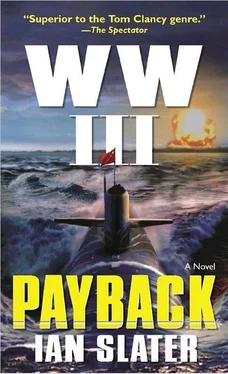“Douglas,” she asked, “I’d like your opinion on something. I’m sending someone over from an office in Monterey for a chat. Strictly verbal.” He knew she meant the FBI.
He wasn’t fooled for a second. Maggie Thatcher and Indira Gandhi aside, the fact, as Douglas Freeman saw it, was that women were far more reluctant to commit bodies to action than were men. For most women, like Catherine, God rest her soul, and Margaret, intuitively wanted, believed, there could always be peaceful resolutions. A sexist view, he told himself, but true. Yes, there were female fighter pilots, naval aviators even, and damned good ones, such as those on Admiral Crowley’s McCain carrier battle group, but they remained the exception that proved the rule. Most women didn’t like to fight, and Eleanor, he could tell from her tone, her firm grasp of realpolitik notwithstanding, wanted to be sure of something, which Freeman suspected had something to do with the ever-rising public clamor for a Freeman-like “in, hit, out” op. She needed moral support.
“When can I expect your courier?” he asked Eleanor.
“About noon your time in Monterey.”
“Very good. And Eleanor…”
“Yes?”
“I appreciate you bringing me in from the cold.”
“Oh, Douglas, you’re not in exile.”
He almost said, “Sure as hell feels like it sometimes,” but that was nosing into self-pity country, and that, in the general’s eyes, was as contemptible as being a yuppie thread-counter.
“I haven’t had breakfast in bed,” began Margaret, “since…” She paused, dabbing her lips with the paper-towel napkin that Douglas had made into a sort of triangle and plopped near the edge of the tray. “I can’t remember when,” she continued joyfully. “You’re so gallant.”
She knew she would never forget the unselfish way in which he had lain with her after. In almost everything she’d read or heard about sex, the man so often just rolled over or left. Or snored.
As he removed the tray, telling her someone was coming to the house at noon, she started. “My glory!”
“I’m sorry,” he said, recalling how giving Catherine such short notice of an impending visitor had always jolted her into a cleanup frenzy, with expectations of her having to prepare a first-rate lunch into the bargain. “Don’t worry, sweetheart,” he told her. “I’ll take him out to lunch. You won’t have to—”
“No, no,” Margaret said. “You don’t have to be sorry.” He had completely misunderstood her reaction. She was staring at his pajamas. It was as big as it had been last night. “Does it take days to — well, you know…” She giggled. “To go down?” She was blushing in her surprise at his size, but enjoying it.
“It’s hard to get it down,” he said, smiling, “when there’s such a beautiful woman around.”
There was a strained silence; then suddenly she beckoned him, open-armed. “Oh, Douglas, I’ve never been so happy. I didn’t imagine—”
“Shush,” he said, and this time threw the bedclothes aside with abandon.
She was thrilled and alarmed. “I haven’t showered, I haven’t—”
“To hell with showering,” he told her. “I want to smell you, every part of you — I want to consume you, every inch of you.”
She drew him to her with such violence and speed, it excited him even more and, lifting her translucent nightie, he began kissing her thighs, moving quickly from one to the other and then, suddenly, shockingly, she felt his tongue in her, at once hard as steel, soft as velvet, its fierce probing and sucking of the warm juices between her legs sinking her into paroxysms of pleasure, her head lolling side to side in a surrender so wildly complete she knew she’d do whatever he wanted. She cupped his hands on her breasts, crying, arching her body, and begging him to go further, deeper, praying it would never stop. The thought, albeit fleeting, of him leaving her, going away, was an unbearable torture. She wouldn’t let him.
At the White House, the press conference was minutes away, the President’s press officer, Melvin Spinner — a name made in hell for a White House press officer — quickly briefing him on a Gallup poll that revealed the American people’s major concern was the presence of terrorist sleeper cells within the United States.
The President met the problem head-on in the media scrum: “This administration is doing all we can to flush out these terrorist cells, but, as this latest outrage against the American people has clearly demonstrated, it’s the weapons they are using that pose an equal danger.”
“Mr. President,” asked the New York Times reporter, Steve Loren. “There’s a rumor in the intelligence community that the missiles used to down the three planes are indisputably North Korean. Can you comment on that?”
“This administration doesn’t formulate policy on rumors, only on facts. As I’m sure you can appreciate, Mr. Loren, the debris caused by such attacks makes it extremely difficult to identify the actual missiles used in the launchers we’ve found, and their country of origin. It’ll take time, possibly several months, to make that precise determination, if indeed we can find an identifiable weapon part in the rubble.”
“Excellent!” said the Chief of Naval Operations, watching the telecast on the Oval Office TV.
“Yes,” agreed the Army Chief of Staff Kruger. “This way, those bastards in Pyongyang won’t expect a hit for about a year.”
The other Joint Chiefs, the Air Force’s Lesand and the Marines’ General Taft, also approved of the President’s adroit political — indeed, military — sleight of hand.
“Eleanor,” said the CNO, “I suggest we arrange a leak in a few days that we suspect the launchers are from Iran, or Syria. Give our North Korean thugs an even greater sense of security.”
She nodded. “We should feed it to Loren at the Times. Show him one of the Syrian launchers we captured in Africa.”
It made Eleanor uncomfortable, lying to the press, and she only ever did it when absolutely necessary. Now, any reservations she might have had were squashed by the need to avenge the mass murder of so many Americans, in the same way the Clinton administration had to lie about an “accidental” bombing of the Chinese embassy in Belgrade in May of ’95 when NATO intelligence discovered the Chinese were using their embassy to forward Milosevic’s orders to the Yugoslav embassy.
As she left the Oval Office to pass her note to the President, the Joint Chiefs were having their own ad hoc council of war. The CNO initiated it with a sudden turnabout suggestion, while Eleanor Prenty was attending the press conference, to conscript “George C. Scott” into unofficial service for the Joint Chiefs. “Why not,” the CNO suggested, “invite him to lead a SpecFor payback attack on Kosong in the next two to three months, seeing as how the CIA’s confirmed all three launchers have come from there?”
Lesand concurred, but added, “He’ll have to plan it carefully to the very last detail. We don’t want to be even peripherally involved in a repeat of Jimmy Carter’s ‘Operation Rice Bowl’ fiasco when our Special Forces flew into that talc-fine dust storm—”
“The haboob, ” cut in Kruger.
“Well, whatever kind of boob it was,” said the CNO, “it downed our Sea Stallions at Desert One and scuttled the whole damn mission, so instead of getting our hostages out of Iran, we only worsened the situation.”
Lesand nodded gravely. “Rice Bowl” in 1980 had ended in disaster as a Delta Special Ops helo, choked by the talc-fine dust, collided with one of the big C-130 Hercules. The aborted mission had not only failed to rescue any of the American hostages in Tehran, 250 nautical miles away, but had also left the Iranian Muslims with five state-of-the-art Sea Stallions, which, because they’d been abandoned intact in the desert rather than being “sanitized”—gutted of highly secret codes and equipment — meant that the Iranians also garnered an enormous intelligence coup. It had cost Carter the presidency, and scores of Pentagonians their careers.
Читать дальше












